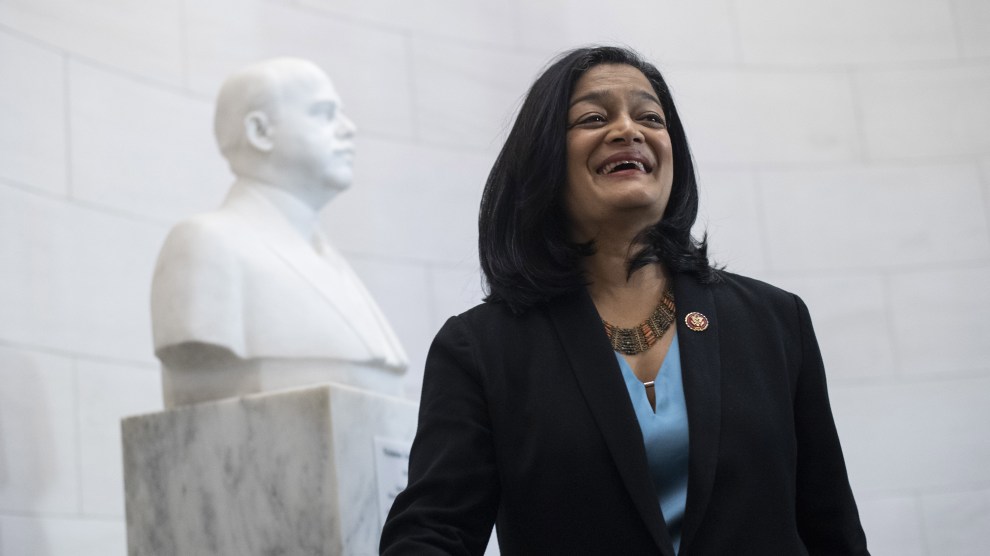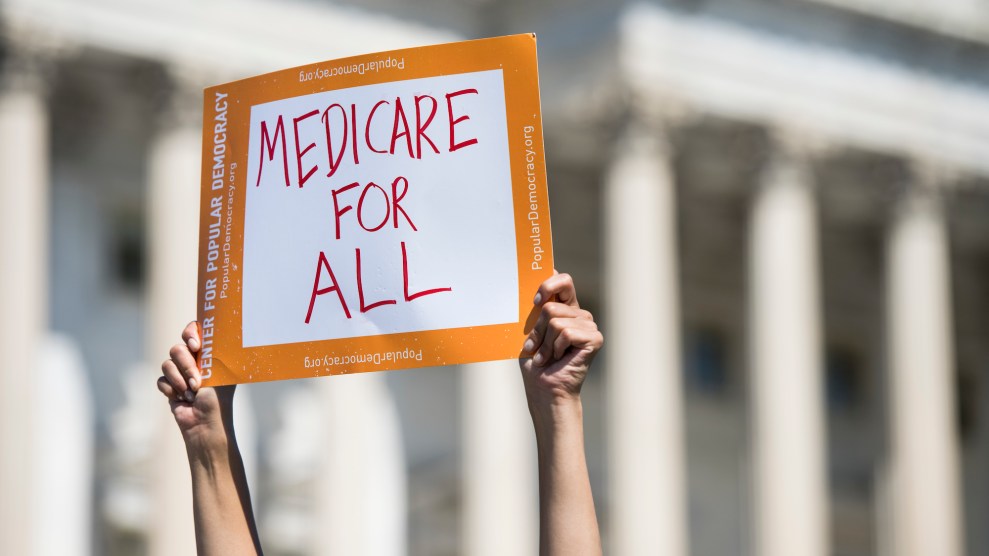
Tom Williams/Congressional Quarterly/Zuma
Pramila Jayapal, the second-term Democratic congresswoman from Washington, dubbed a “rising star in the Democratic caucus” by House Speaker Nancy Pelosi, has been fighting for immigrants’ rights since waves of xenophobia swept the nation after 9/11, and is now one of Congress’s leading critics of President Trump’s draconian immigration policies. Following a hectic few months serving on the House Judiciary Committee, championing Bernie Sanders as one of his campaign’s leading surrogates, and pushing Medicare for All legislation in Congress, Jayapal sat down with Mother Jones Editor-in-Chief Clara Jeffery to discuss the 2020 race, whether “Bernie Bros” really exist, Trump’s immigration policy horror show, and so much more.
Listen to this special Friday bonus edition of the Mother Jones Podcast to hear the conversation, recorded onstage in front of a live audience at the Commonwealth Club in San Francisco earlier this month. Below is a condensed and edited version of the discussion.
You first gained national recognition following 9/11 when you founded an organization about immigrant rights, and Muslim rights in particular. Was being Hindu an asset to that work of sticking up for Muslims?
I was raised as a Hindu. I suppose I would consider myself one, but it wasn’t so much about that. It was really about the civil liberties abuses that I saw. It took me 17 years to become a US citizen, and a whole alphabet soup of visas. I had literally just become a US citizen in 2000, and then 9/11 happened. Suddenly there was an “us” and a “them,” and I was in the “them” category because I didn’t look a certain way. Then I started hearing about the civil liberties abuses against Muslims, Americans, Arab Americans. All of that felt to me completely anathema to what I had just committed myself to the year before in becoming a US citizen.
I felt so strongly that I had to speak out. We successfully sued President Bush at the time for the deportation of around 4,000 Somalis across the country. We won. I realized then that perhaps if I hadn’t been a citizen, I would have been even more afraid. That was a scary time, but it felt to me like the most patriotic thing I could do.
You’ve been a big advocate in Congress for Muslim Americans. Trump just extended the so-called Muslim travel ban to a bunch of countries: Nigeria, Burma, Eritrea, Kyrgyzstan, Sudan, and Tanzania. What’s your analysis of why these countries were picked? It’s not entirely logical.
Yeah, but what is these days? If you look at those countries, five out of six are Muslim majority countries. The theoretical argument for adding these countries to the list is that they don’t meet a certain standard of security and reporting lost and stolen passports. But there are many countries that don’t meet that threshold. These are all parts of coordinated efforts, primarily run by Stephen Miller out of the White House, and a very coordinated anti-immigrant movement in the country, that is interested in stopping all immigration, with a particular xenophobic and religious targeting of Muslims.
I feel like the candidates have a lot to say about why Trump’s immigration, asylum, refugee programs are horrible on many different levels. They haven’t done that much to lay out what their program would be. What do you think a real immigration reform package could look like that could actually pass through Congress?
The question of how we solve immigration is not actually a policy problem. It’s a purely political problem. Immigration policy in this country has never been about policy. It has always been about who we are as a country and what we’re willing to stand up for. We need a whole new moral imagination on the role of immigration in the United States.
President Clinton and the passage of IRA, which was the Immigration Reform Act of the mid-’90s, actually started cementing the criminalization of migration. If we don’t go back to that and reverse some of those bad effects of the mid-1990s, then we will continue the problems we have. We have to deal with detention in addition to humane immigration reform. That would take away a lot of the problems with interior enforcement and detention. We have 56,000 people every night that we are locking up in immigration jails, mostly operated by for-profit prisons like GEO. The vast majority of those people have never committed a crime, much less been charged with a crime.
One of your other signature issues has been furthering access to health care, and you’re a proponent of Medicare for All. You were among the people that Elizabeth Warren consulted with to come up with her position. Why did you endorse Bernie over her?
I really believe that Bernie Sanders created the momentum for the movement for health care reform in this country, for single-payer, universal health care. At the end of the day, I am a Brown immigrant woman. I do not have the luxury to look at my choices through a single lens. Racism, sexism, classism are all intertwined. And I care about foreign policy, I care about immigration policy, I care about health care policy, I care about income inequality. And on all of those fronts, Bernie Sanders was the person that was most closely aligned for me.
In addition to that, I’m an organizer. That’s what I did for 20 years before coming to Congress. I don’t believe that any single person in the White House is going to make the kind of structural, bold change that we need to make. That can only happen if we reengage a different kind of democracy, if we get young people, folks of color—who have given up on us, frankly, given up on democracy, given up on government—to be engaged. And Bernie Sanders has this remarkable ability to both inspire a different generation and a multiethnic, multigenerational group of people, but also, to speak with authenticity and sincerity to a very disillusioned group of working class voters who hear him and believe he will fight for them.
I hear what you’re saying, and what the Sanders campaign is saying, that the momentum is everything to get these things passed. But that said, it is going to be Congress, not the president, that hashes out health care reform. And that may not happen on the timetable—or to the degree that you and Sen. Sanders will propose. Do you run the risk of people feeling disappointed in the movement if it doesn’t get there?
I believe that we can pass Medicare for All. I’m not naive about that. I know what we’re fighting against.
In one presidential term?
Yes. But it all depends on what happens in the president we elect. If we don’t elect a Bernie Sanders or an Elizabeth Warren, it’s probably not going to happen.
Let’s say Sen. Sanders wins, but the Senate does not flip. Is Medicare for All going to pass?
Well, that would be tough. There’s no question you’ve got to have Congress in there.
I’m trying to unpack this. It’s as if it would spring fully formed from the head of Bernie Sanders, and that’s just not the way legislation works, right?
It doesn’t spring out of the head of Bernie Sanders, for sure, but if you don’t have a president who will help make the case and you don’t have a movement that will help make the case, then you can’t do it. I’ve got a bill. It’s 125 pages. The point is, Americans deserve universal guaranteed health care. Don’t try to tell us we don’t. And that’s what I feel like the message from outside that we’re fighting against all the time is, and if we have a president that says, “Yes, we deserve this and we will figure out how to make it happen,” you would see everything shift in this country. You would see Congress shift.
One of the things that’s been burbling up again, and to some extent between the Bernie and Warren supporters, is Bernie folks going after the culinary union leaders. Bernie supporters going after them because they haven’t endorsed Bernie or gone all the way to that. Do you worry about this in terms of building the broadest possible—
Look, I think that it’s really overstated, because I will tell you that when I endorsed Bernie in 2016 and when I endorsed Bernie now, I had a lot of people go after me who were Clinton supporters and Warren supporters. Did I make that about them? No. Are there people out there that we can’t control? Absolutely. Do we condone all of that behavior? No, of course not. I get a little frustrated with the perception that there’s a “Bernie Bro,” and that Bernie Bro looks nothing like me, because I can tell you, the people that I know that are on the Bernie campaign, and if you look at powerful women of color who are supporting Bernie, there are many of us, and we don’t want to be erased by some caricature of a group of people that may or may not be.
I will tell you—I’m a little paranoid—but I don’t even know if they’re Russian bots or if they’re real. There are some of them that are real, I’m sure, but if we spend time focusing on the minority of people, we are really hurting ourselves.
You’re on the House Judiciary Committee. You’ve been busy! I think everyone in this audience probably would agree that impeachment was the morally right thing to do, the constitutionally appropriate thing to do. Do you think that it helped Trump?
This president deserved to be impeached. He deserves to be removed. And I don’t think, at the end of the day, that this is a political decision. We take one oath when we come in and it’s to uphold the constitution, and there is no way I’m going to bed and waking up in the morning and looking at myself in the mirror and saying, “I’m worried about whether this is going to help him or whether it’s the politically right thing to do.”
Will the House Judiciary Committee subpoena Bolton and Mulvaney and others now? Now that the Senate has acquitted on this, is there something the House Judiciary wants to do?
We’re not going to stop doing the oversight we can do. We have Bill Barr coming in to the Judiciary Committee in March, but before then, we are going to have a series of hearings to specifically go into the sidelining of prosecutors and the interference of the sentencing of Roger Stone. We will essentially be looking at the ways in which this Department of Justice under Bill Barr is being politicized and is being used purely for Donald Trump to achieve his goals.
In the past year, you’ve disclosed two very personal things. The first is that your child is nonbinary, and the second, that they were born very premature and were very fragile for years afterwards. As a result of that, when you later got pregnant and were told by your doctor that the second pregnancy would probably take that course, you decided to terminate that pregnancy. Tell me what that was like to share that kind of thing so personally.
I thought a lot about the telling people about my abortion. In the wake of the states passing abortion bans, I felt like I had this powerful platform and I should use it to tell this story so that people understand that they can tell their stories if they want to. I was on a plane to DC and I just wrote the piece and it came out in one fell swoop.
The response was amazing. So many emails, letters, phone calls from across the country about people having conversations at their kitchen table and their mother or their sister or their friend suddenly disclosing that they too had had an abortion and what that meant for them. And I felt like that was the best thing that could’ve happened, was for people to talk about it and not to feel ashamed about these choices. Whatever your choice is, is what we’re fighting for. We’re fighting for that agency.
Talking about my 23-year-old was very different. We were debating the Equality Act in committee and the Republicans were talking about transgender people and non-binary people in such a horrendous way that I could feel the rage in me. I texted Janak and I said, “I’m just feeling like I want to talk about you. Can I tell your story?” And then I immediately texted back and said, “You know what? That’s not fair. Forget about it. Whenever you’re ready.” And they texted me back with one question. They said, “Do you think it’ll help people?” And I said, “I think it will, but it’s totally your choice and we can do it in a planned way. We don’t have to do it right now.” And they texted back and said, “No, I really don’t want it in a planned way. I want it to be organic, and if it feels like it’s going to help and it feels like the right thing, then go ahead.”
I knew I was going to get really emotional talking about it, which I did, but oh my god, am I so happy I did. To this day, people write to me and say, “I never thought I would see a Congress member using the pronoun ‘they.’ I feel seen, I feel heard.” And I think that is what I try to use this platform for, to give some lift to the voices that are already there, but just aren’t being lifted up in the way that they should. And if I can do that, and if I can give people some sense that they are represented, that they’re seen, that they’re loved, that they’re believed in, then I think I’m doing a good job.
Correction: An earlier version of this story misstated Jayapal’s time in office. She is in her second term.














